Update: Please do read this post and comment on it, because it’s interesting and pretty and important, but don’t leave your links to your HSF/M Foundations challenge blog posts on this one, because that’s not what it’s for! They belong on yesterdays post. 🙂
Five years ago I made this ca. 1800 dress, inspired by two portraits of Madame Recamier:
I managed to make it in one day, even though it is predominantly hand-sewn. Unfortunately, in the rush to make it, I didn’t double-check Janet Arnold, and I made a rather big mistake.
Can you see it?
It’s the front-skirt to bodice join. I gathered my entire front skirt to the apron bodice, where there should have been almost no gathering, and the sides of the skirts should have hung over, and wrapped around the back, thus eliminating that enormous fold running down the side of the skirt, and the weird gathered-front but flat sides effect.
I realised the mistake almost as soon as the dress was done, but didn’t fix it. Every time I’ve worn the dress in the 5 years since, it has bugged me, and I’ve thought “I really should fix this.” But I just didn’t get to it.
Then, two weeks ago when Theresa and I did our Regency photoshoot, I remembered it again, and kicked myself when I hadn’t thought to fix it beforehand. I’m particularly gutted about it when I look at the photos (so gorgeous) but know the dress isn’t right.
And, to top it all off, when I finally decided to fix it, it took less than two hours, all handsewing, to get it perfect. I unpicked the bodice from the skirt, flattened the skirt, matched centers, sewed the skirt to the bodice lining, sewed the bodice front down over it, hemmed and sewed together the sides and back facings, sewed on ribbons, and worked ribbon carriers.
Here is what it now (and should) look like. Flat front, tabs extending to the sides to wrap around the back:
Tapes sewn to the sides of the skirt wrap around the back and tie underneath the front:
The front skirt is folded back and sewn to itself at the side slits, to help to cover them and to form a facing:
I worked little thread loops at the back, to help carry the skirt tapes and keep them in place.
And while I was at it, I made a new cord for the front lacing that hides under the apron front, as the old cord had broken and was too short (clearly my cord-making skills need work):
The dress still isn’t 100% correct, and still represents my sewing 5 and a half years ago), not my sewing today. But it is much, much better, and I feel much better about it. When I made it, it was meant to be the foundation of a Regency wardrobe – to get sleeves, and a chemisette, and a spencer, and be wearable in lots of situations.
That may still happen, but that is not entirely how this is a foundation.
If not that, how is this a foundation? I want the my sewing to be based on getting things right. Taking the time to research things, and fit things, and sew things properly, so that every garment represents the best I could possibly do. And when I do make mistakes, I want to fix them right away. I’m not going to fix all of my older garments that I am not happy with, but I am going to pledge that everything new going forward will be something I can be 100% proud of.
And that is a good foundation.
The Challenge: #1 Foundations
Fabric: None new
Pattern: ca. 1800 Apron front gown in Janet Arnold’s Patterns of Fashion
Year: ca. 1800
Notions: cotton thread, art silk ribbon.
How historically accurate is it?: Well, a lot better than it was!
Hours to complete: Just 2 to fix it.
First worn: Not yet, but maybe I can convince Mr D to do another photoshoot this weekend!
Total cost: None.

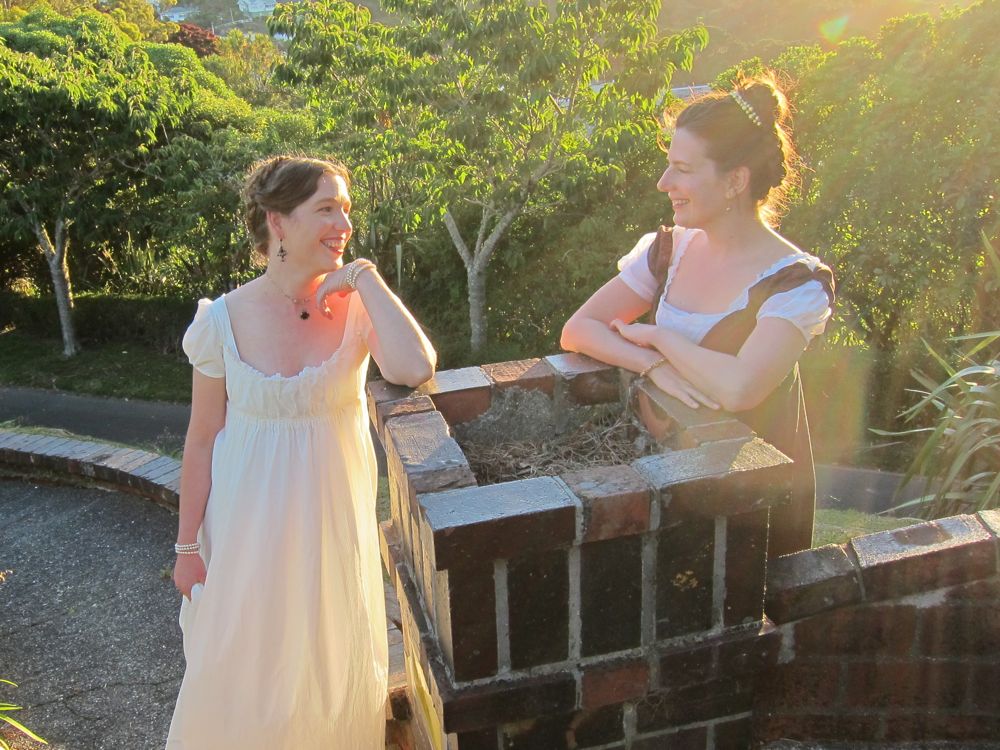
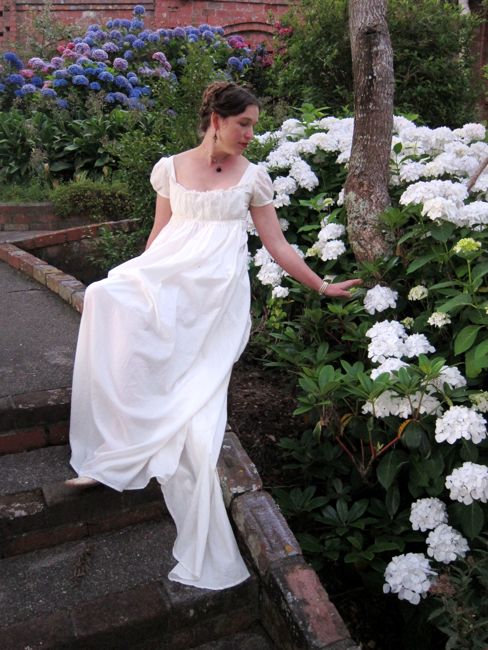
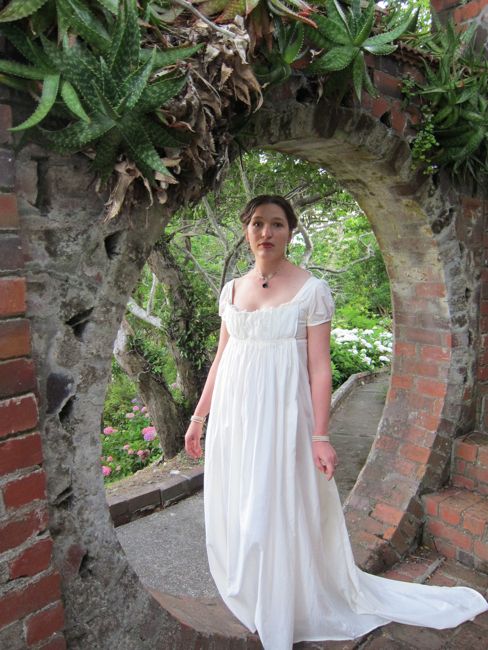
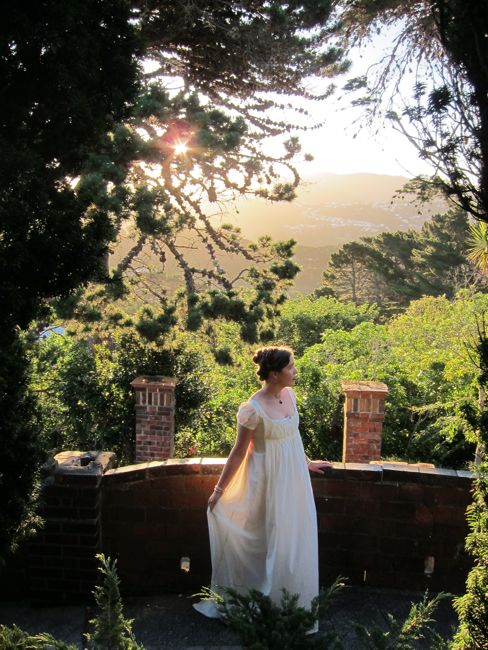
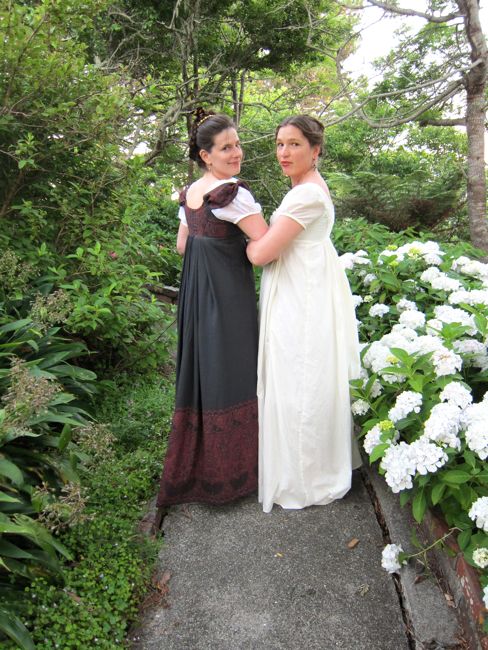
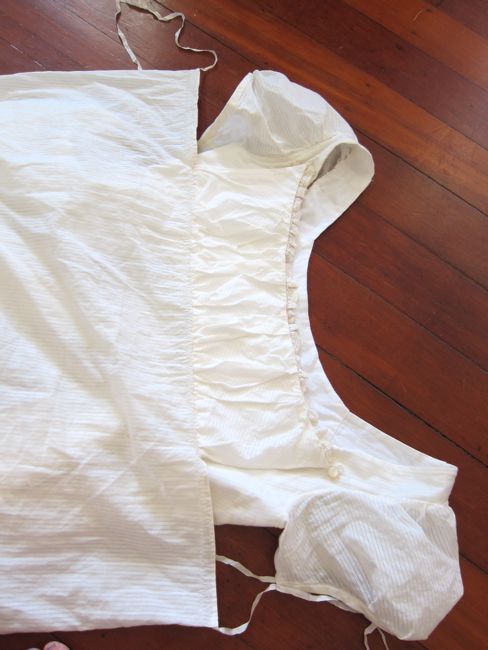
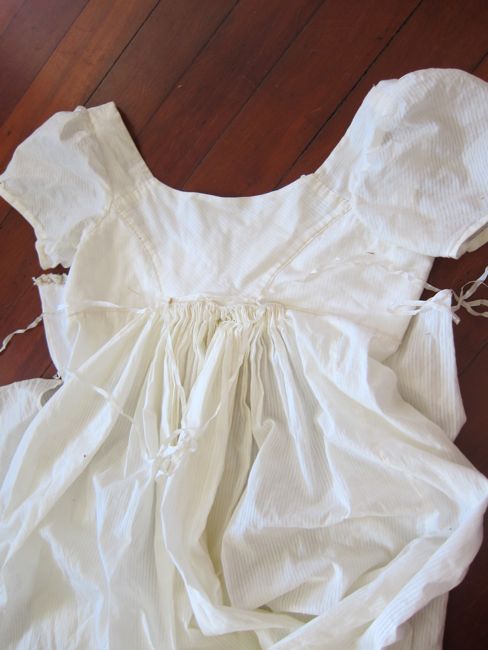
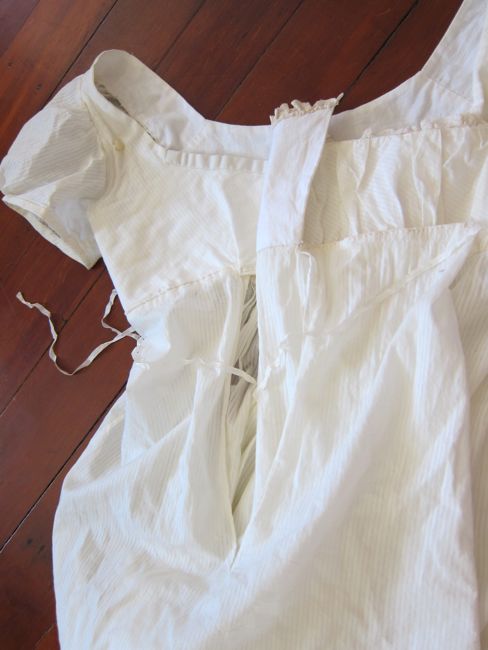
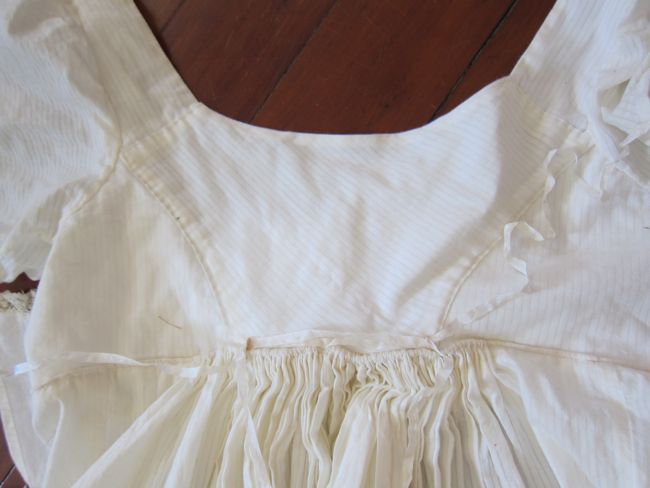
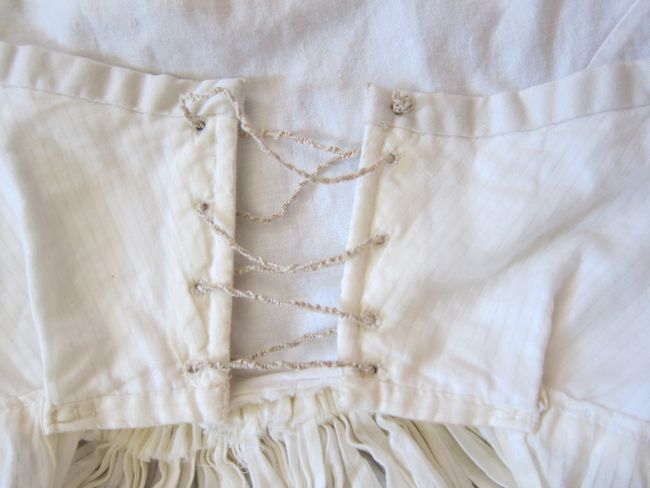
It’s gorgeous! Even in its pre-corrected state, it was lovely. Love the interpretation of “foundation”, too.
You are so right! When one is a perfectionist, the ‘wrong’ bit is always going to be like a rose thorn in the sole of one’s shoe. (That happened to me a couple of weeks ago – ouch!) I confess I did notice the sides of your dress, and I rejoice that it is now as it should be!
Such a glorious photo shoot!
Lovely pictures, especially the one of you two lovely ladies smiling at each other. Of course, we all started somewhere and have made odd mistakes over the years. Going forward with the best intentions is a healthy way to move forward and great way to interpret the foundations challenge. It shows strength of character when we share our glorious moments as well as our mistakes. 😉
Best,
Quinn
A lovely dress fix, and I’ve made the same mistake on drop front gowns myself, and your handmade lacing cord is lovely!
Here is my Foundations effort, a 1940s girdle:
http://levagabondage.blogspot.com/2015/01/historical-sew-monthly.html
Beautiful!! Love the scenery too!
Here is my 1870’s Dimity bustle and petticoat:
http://aimeevictorianarmoire.com/2015/01/22/hsm-dimity-bustle-and-petticoat-complete/
It looked lovely before you fixed it (and I didn’t actually notice that there was anything wrong, but that may be because I don’t do a lot of Regency). I like this interpretation of the Foundations theme; if something’s worth doing, it’s worth doing the best job you can, and it’s always so satisfying to fix something that just wasn’t right.
Here is my first entry. I have never done a sew along before. This is fun.
http://segwynesneedle.weebly.com/blog/historical-sew-monthly-entry-january
Here is my Foundations entry, an 1890’s Work Corset! https://costumegirl.wordpress.com/2015/01/29/late-1880s-early-1890s-corset-from-the-kingfisher-chisholm-trail-museum/
I really like the approach you took to the Foundations Challenge. It is important to have a good foundation of the proper pattern, good sewing techniques, etc.!
I made a 1915 combination and corset
http://thedreadedseamstress.blogspot.com/2015/01/historical-sew-monthly-1.html
Thanks for showing us this transformation. I’m often too much of a defeatist to go back and fix things that have gone wrong, so it’s an encouragement to see you do it (and hear that it need not take a whole day to fix something!)
Here’s my offering for this month…
http://ohhatface.blogspot.com/2015/01/historical-sew-monthly_31.html
My first sew along, a little late, but here anyway – my 18th century stays. http://thecostumingdamsel.blogspot.com.au/2015/02/hsm-challenge-1-foundations-18th.html
Inspired by your loose interpretation of foundations, I’ve decided that my 1895 skating ensemble fits this challenge and have just posted about it.
https://quinnmburgess.wordpress.com/2015/01/31/hsfm-1-1895-hug-able-skating-costume/
Best,
Quinn
Thank you for showing us this! Nice to know I’m not the only one who sometimes doesn’t read things right; and a good reminder to fix mistakes now, rather than later. (I have a blue Regency dress I need to fix . . .)
I’ve completed my first challenge – I thought my challenge entry would be stays, and I finished them, but they were a total failure, so I made a bodiced petticoat instead! Both are blogged about at: http://aladyswardrobe.com/2015/02/historical-sew-monthly-challenge-1-foundations/
I love this gown. Also I can relate to how it’s foundational. I did a similar thing to one of my Regency gowns, tweaking and adjusting it to make it fit better and be more historically accurate, for a challenge last year.
For this challenge I made a WWII Era Slip.
http://teacupsinthegarden.blogspot.com/2015/02/vintage-wwii-era-slip.html
Laurie
I would have never thought of the challenge in that way but I like the interpretations. Mine was like a lot of others. I’m happy I’m finally participating!!!! Here you go my 1890s corset! http://bugandbirdphotography.blogspot.com/2015/01/sarahs-corset-part-2.html
I love your interpretation of ‘foundation’. Now that IS a challenge. 🙂